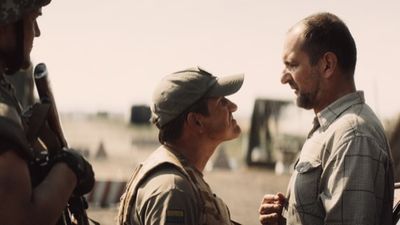In four episodes set in present-day Donbas, director/screenwriter Natalya Vorozhbit uses simple situations to observe what could be called a “diagnosis of humanity”, from its shifts and deformations, large and small, to its complete collapse. In the first story, a car stops at a military checkpoint. In it sits a man who has mistakenly brought his wife’s passport instead of his own. The second episode demonstrates that war, or at least that which indistinguishably resembles it, has impacted intergenerational relationships, opinions and communication among teenagers. The third part, set in what appears to be a bombed-out spa, is imbued with dread, with the two characters, a man and a woman, stumbling blindly through an ambiance oscillating between violence and eerie intimacy. The final chapter’s poetics are reminiscent of Aleksey Balabanov and Sergey Loznitsa’s best work, specifically its references to the benevolent goodness of folktales and their protagonists’ transformation into terrifying apparitions without a trace of genre stylization.
